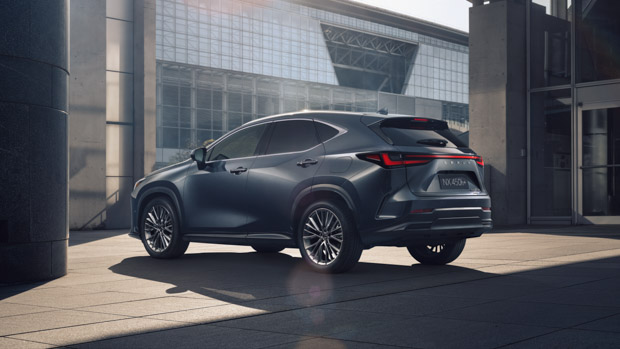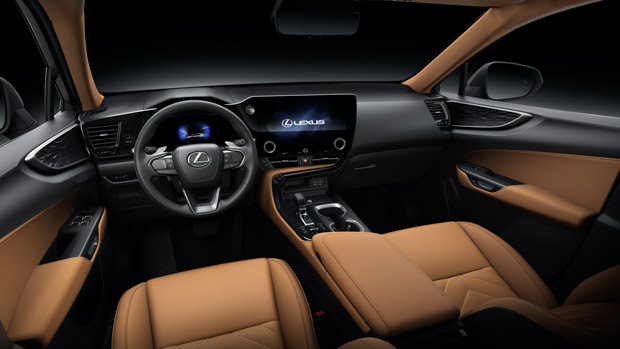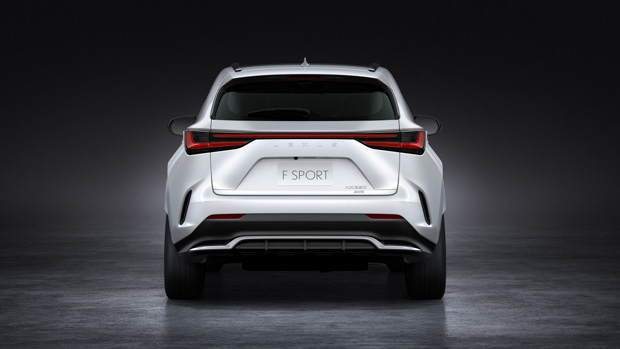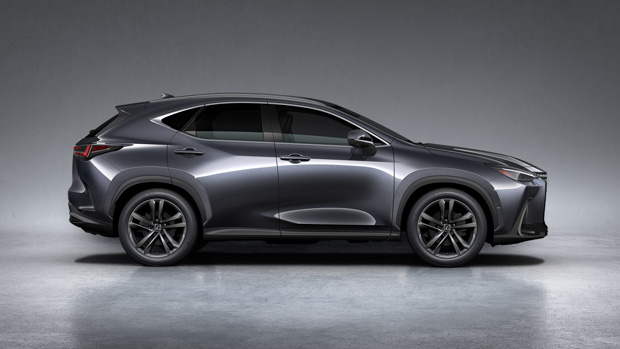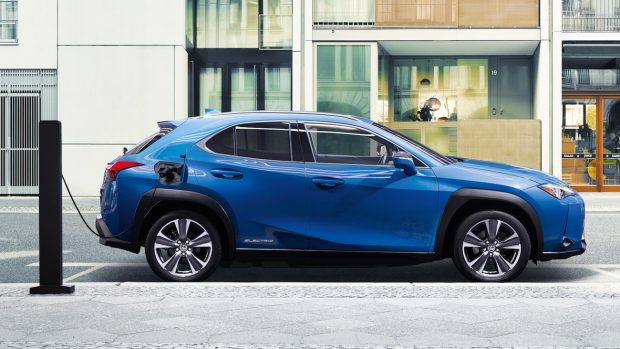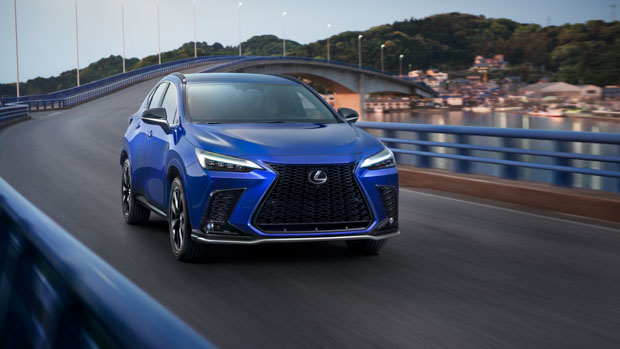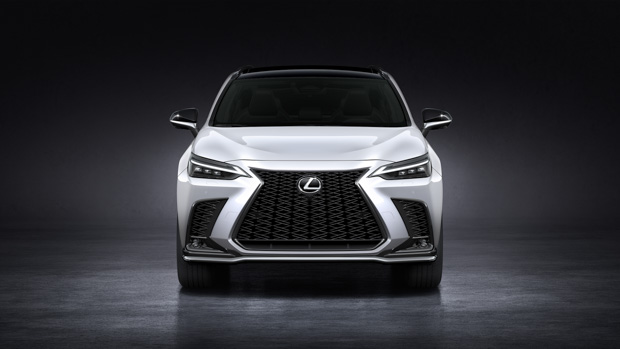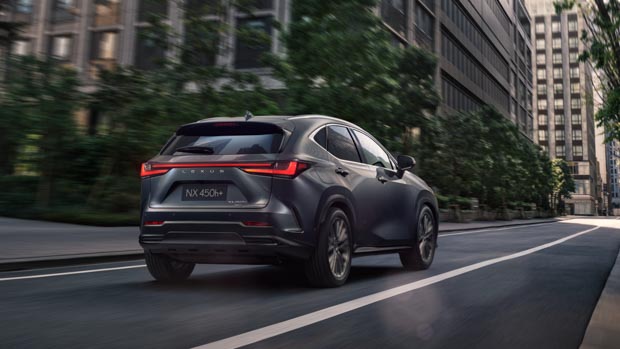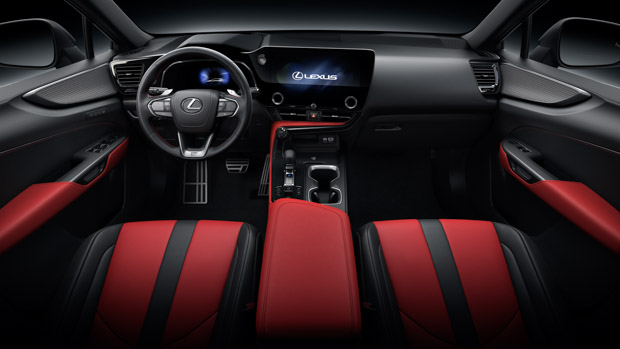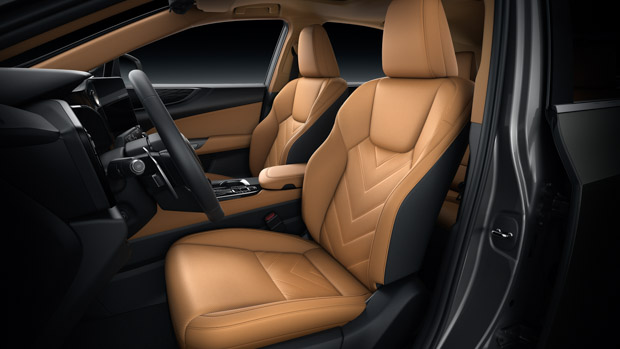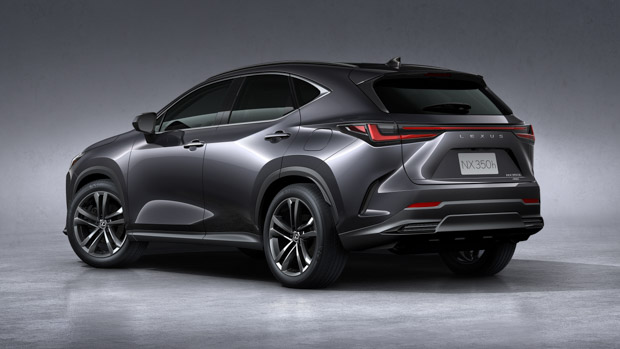-
Car Reviews
- Car News
-
Car Comparisons
Latest comparisons
- Chasing Deals
The most popular vehicle in the Lexus lineup has been renewed for a second generation, with a set of diverse powertrains that include the brand’s first plug-in hybrid.
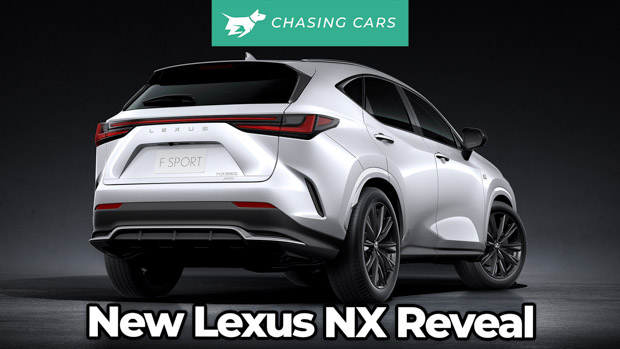
Ahead of a November 2021 launch in Australia, the 2022 Lexus NX midsize SUV was unveiled this afternoon with its maker labelling the second-generation luxury crossover “all new and finely tuned to you.”
Just 20mm longer and 20mm wider than the outgoing car, the second-generation NX transitions to a new modular platform while retaining the small-midsize dimensions that catapulted the first-gen vehicle to success in Australia.
About one million examples of the first-generation NX were sold globally, and the NX has become the most popular Lexus in key markets.
The same is true in Australia, where the NX accounted for 40 per cent of Lexus sales in 2020, while also claiming third place in the luxury midsize SUV segment, running behind the Mercedes-Benz GLC and the BMW X3, but ahead of the Audi Q5 and Volvo XC60.
Underpinning the 2022 NX is the recently-developed TNGA-K platform. This architecture, nicknamed GA-K, has been responsible for dramatic improvements in ride and handling in the other vehicles that use it, namely the Lexus ES sedan, the new Toyota Kluger large SUV, and the Toyota RAV4 midsize SUV.
Keen drivers should find the new NX a more engaging drive, partially due to adaptations to the modular GA-K platform that are specific to the Lexus – including a key decision to site the batteries for hybrid models ahead of the rear axle, rather than behind it, as on the RAV4.
Four engines have been developed for the new Lexus NX. Three have been confirmed for Australia, while a fourth plug-in hybrid powertrain remains under consideration, but has not been locked in for our market.
Power and torque figures for Australia have not been confirmed for any of the four powertrains at this point, though they have been confirmed for the United States, with an estimate for the plug-in hybrid. We detail these figures below.
The range will commence in Australia with the NX 250, which will utilise a 2.5-litre direct-injected four-cylinder petrol engine mated to an eight-speed torque converter automatic gearbox and front-wheel-drive. For North America, the NX 250 produces 151kW of power and 250Nm of torque. Australian figures will be confirmed later.
From there, buyers will be able to step into a series-parallel petrol-electric hybrid in the form of the NX 350h. The new NX hybrid will make use of a similar 2.5-litre hybrid powertrain to that seen in the ES 300h.
In the hybrid, a CVT transmission will pair with either front-wheel-drive, likely with around 160kW of power, or with an optional eFour electric AWD system that boosts power to 178kW in American markets, with a similar figure expected to be confirmed later for Australia. Up to 80% of combined torque from the hybrid system can be sent to the rear axle on AWD versions.
The flagship engine at launch is likely to be the NX 350, which utilises a new 2.4-litre turbocharged petrol four-cylinder engine that will produce about 205kW of power and 430Nm of torque. Again, those are US-market figures with precise Australian numbers set to be confirmed soon.
Likely to be sold only in athletic F Sport guise, the turbo NX 350 enjoys “additional platform reinforcement” for greater rigidity, according to Lexus head of engineering Takeaki Kato.
A full-time AWD system is standard with the turbocharged 2.4-litre engine, allocating up to 50% of available torque to the rear wheels via an electronic control unit. The transmission is an eight-speed torque converter auto.
Lexus will launch its first plug-in hybrid powertrain in the 2022 NX as part of its push to launch “more than 10” full battery-electric, plug-in hybrid, hybrid and other electrified vehicles by 2025.
To be badged the NX 450h+, the NX PHEV pairs the NX 250’s 2.5-litre petrol four-cylinder engine to both front and rear electric motors. A lithium-ion battery pack measures 18.1kWh in capacity, and will provide the plug-in NX with around 75km of electric driving range on the WLTP testing cycle – though a final all-electric range figure is yet to be confirmed.
Should the PHEV firm up for Australian delivery, it would sit at the top of the range where it would compete squarely with the Mercedes-Benz GLC 300e ($93,800). The NX 450h+ will produce an estimated 230kW of power, making it something of a performance hero for the NX range.
Lexus head of engineering Takeaki Kato said that the plug-in hybrid NX would feature a new torque control distribution system that the brand is developing to ensure EVs retain a typical Lexus driving signature.
At launch, a battery-electric NX will not join the fully-electric UX 300e on as a full EV offering, though senior Lexus executives have not ruled out an NX BEV later down the track.
“There is the possibility, since we already have the UX 300e in our line,” Hiroo Togashi, Lexus general manager of brand management, told Australian media.
“For the NX, we do not have planned as at the start of sales to have a battery electric vehicle.”
It is understood the reason for not launching with a fully-electric NX is because Lexus will launch a dedicated electric midsize SUV in 2022, utilising the same e-TNGA platform as the Toyota bZ4X crossover announced last month.
The UX 300e is coming to Australia and will arrive alongside the new NX in November.
The new NX becomes the second vehicle after the 2021 IS sedan to be overtly developed at the dedicated Lexus test track facility at Shimoyama, southwest of Nagoya.
Partially modelled on Germany’s Nurburgring and out of sight of prying cameras, key Lexus figures say that Shimoyama provides a very trying testing environment for powertrain, ride and handling development.
“The engineers – and the car – were repeatedly tested and developed at the Shimoyama test course, where harsh driving environments from around the world are replicated,” Mr Kato told Australian media.
“The base performance of this vehicle is much-improved [due to] repeated testing at Shimoyama.”
In second-generation form, the 2022 NX has a 30mm longer wheelbase and sits on a wider track, allowing the fitment of 235-width tyres up to 235/50 R20 in size.
The suspension of the new NX is MacPherson strut at the front and trailing arm double-wishbone independent suspension at the rear. A new shock absorber design should improve the ride, while F Sport grades will offer a new-generation adaptive damping system.
In addition, the NX picks up a Lexus-first variable steering ratio to provide quicker steering at faster speeds while aiding more precise low-speed maneuverability.
Brake feel is said to be improved for the hybrid powertrains, with a new brake pedal return damping mechanism.
Rigidity is improved compared to the outgoing NX. Though Lexus does not provide an overall improvement figure, there are a number of new reinforcements and braces compared to the outgoing version, as well as additional bonding.
While the 2022 NX retains similar dimensions to the outgoing version, the SUV sports a design that is more rounded and organic compared to the hard-edged, avant-garde first-gen. The aerodynamic changes result in a 15 per cent quieter cabin, the brand says.
Lexus head of design Koichi Suga said that the NX is the first in a series of models to wear a new design language for the brand that he believes projects an image of simplicity and technology.
The wider track of the GA-K platform has allowed the fitment of larger and wider tyres, bringing both a performance benefit and also a wider stance for the second-generation car.
While the NX continues to utilise a transverse engine layout, the bonnet has been lengthened to give the SUV a more desirable, cab-rearward silhouette, while the profile of the new NX distinctively “kicks up” towards the rear wheels and tailgate.
While the front end retains the brand’s familiar spindle grille, the tail of the NX is fresh, with a full-width ‘heckblende’ light bar, and debuting a new word-mark for the brand after a decision that the L-mark and the word ‘Lexus’ should not appear together.
While the exterior of the second-generation NX is still identifiable as a midsize Lexus SUV, there has been a much more comprehensive rethink of interior design.
Lexus have followed up their small steps in introducing touchscreens to the RX, ES and other lines by drastically enlarging the infotainment display and banishing the unloved Lexus Remote Touch haptic trackpad to history.
A 14-inch touchscreen runs new software and sits well within touching reach of the driver, while the panel itself is inclined toward the driver’s seat. The NX will be the first Lexus to be fitted with the wireless version of Apple CarPlay and Android Auto, while wireless smartphone charging is expected to be standard.
A ten-speaker base stereo can be upgraded to a 17-speaker Mark Levinson premium sound system with a subwoofer that makes use of the body frame to enhance deep bass.
Head of design Suga says the new interior embraces the Japanese concept of tazuna, or human-centricity – with the goal of reducing eye and hand movement, centralising screens and key switches within easy reach.
There is a new steering wheel with touch-sensitive spokes ahead of a refreshed digital cockpit, and a head-up display that bolsters the suggestion that less eye movement will be required compared to the previous NX.
A number of colour choices will be available inside, including a two-tone black/rich cream combination pictured here, paired with orange stitching.
In addition, 64-colour ambient lighting will be available.
Lexus have confirmed that the 2022 NX will arrive in Australia in November of this year – but only in NX 250 2.5-litre, NX 350h hybrid, and NX 350 2.4-litre turbo guises.
A decision on a plug-in hybrid is expected to be made in the coming months.
Pricing for the outgoing 2021 NX ranges from $57,500 for a two-litre turbo NX 300 Luxury, to $79,088 for the range-topping NX 300h Sports Luxury hybrid.
We’d expect to see an entry grade around the sixty-grand mark. Full pricing and specifications will be released closer to the Australian launch of the new NX in November.
Latest news
About Chasing cars
Chasing Cars reviews are 100% independent.
Because we are powered by Budget Direct Insurance, we don’t receive advertising or sales revenue from car manufacturers.
We’re truly independent – giving you Australia’s best car reviews.
